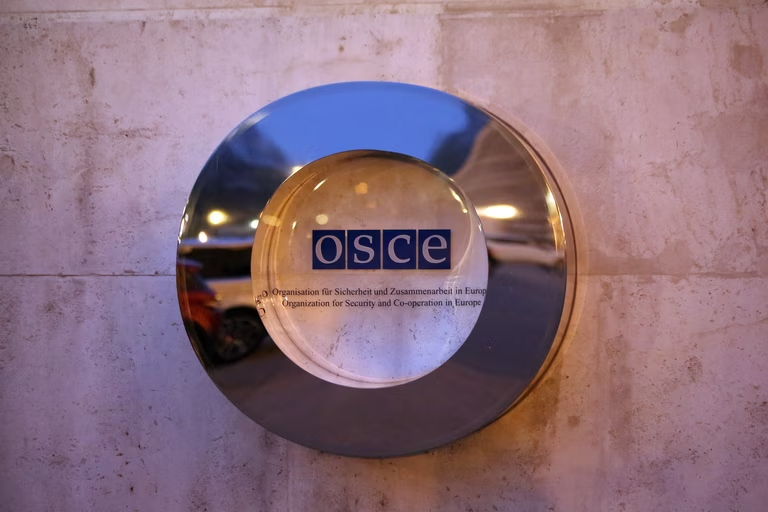
OSCE - Organisation for Security and Cooperation in Europe
Excellent resource on the world's largest peace security organisation. Focused on conflict prevention, arms control, democracy, human rights, counter-terrorism, and press freedom.
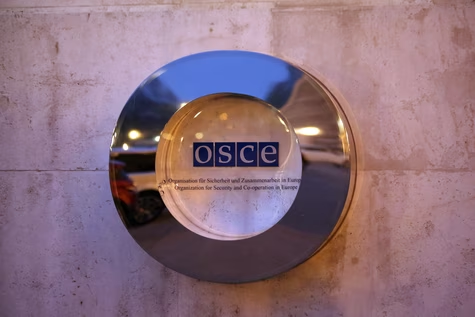
➡️ OSCE - Organisation for Security and Cooperation in Europe
The OSCE is the world's largest regional security organisation. There are 57 member states from across North America, Europe and Asia. Their main focuses are on security, peacebuilding, and conflict prevention. The organisation works hard to promote dialogue and cooperation on a wide range of important issues, including arms control, human rights, and economic development.
This year marks 50 years since the Helsinki Final Act, a landmark agreement signed by 35 states from both the East and West during the Cold War. It laid down the principles for respect for sovereignty, economic cooperation, and peaceful dispute settlement. It serves as the foundation for the OSCE today.
Jump straight to our resources on the ➡️ OSCE
Explore our comprehensive guides on -
-
The Refugee Crisis
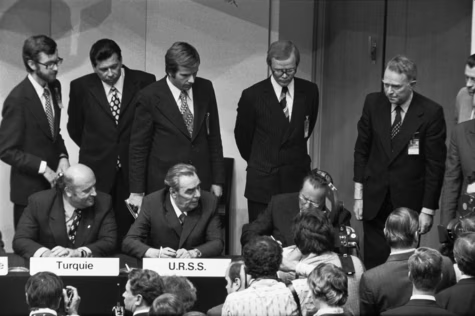
The OSCE is a primary partner of the United Nations, delivering annual reports to the Security Council and having collaborated for more than three decades. The OSCE has observer status in the UN General Assembly, and UN representatives often attend OSCE Permanent Council meetings.
Field operations of the OSCE are regional and primarily based in South-Eastern Europe, Eastern Europe and Central Asia. Their approach to peacekeeping is integrated and flexible, with conflict prevention, crisis management, and post-conflict rehabilitation at the forefront of their work.
Historically, they have played a crucial role in addressing transnational threats, including terrorism, human trafficking, and cybercrime. On a more local level, they monitor elections, support democratic institutions, combat corruption, and promote stability. The OSCE apodts a human-centred approach.
*****
OSCE & the Russian Invasion of Ukraine
The OSCE has been heavily involved in the Ukraine crisis since the invasion and annexation of Crimea in 2014 and the subsequent fighting in Donbas. The OSCE Special Monitoring Mission to Ukraine was an international civilian observer mission to help reduce tensions and foster peace in Ukraine.
OSCE monitoring faced frequent access restrictions and signal jamming, preventing them from completing their work. Following the 2022 invasion, Russian opposition meant that a consensus was not reached on extending the mission's mandate, and all staff were evacuated.
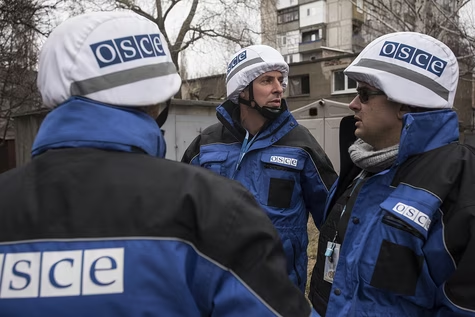
When the OSCE invoked the Moscow Mechanism against Russia to report on human rights issues, two former OSCE staff members were sentenced to 13 years in prison on charges of treason.
The OSCE also chaired the Trilateral Contact Group – a conflict resolution and mediation mechanism focused on finding a peaceful and sustainable resolution to the conflict in eastern Ukraine. It also ended after Russia invaded Ukraine.
The OSCE declared the invasion in 2022 a "gross violation of international law" and a "violation of the Helsinki principles by the Russian Federation".
The Parliamentary Assembly has urged full implementation of the Minsk Agreements to end the conflict and has focused on supporting high-level discussions to resolve differences, as opposed to military action, which is only escalating tensions.
In May 2022, Vice-President Reinhold Lopatka was appointed as the Assembly's Special Representative for Parliamentary Dialogue on Ukraine. The high-level delegation conducted a meeting in Ukraine to support and show solidarity with Ukraine, and bolster ICC investigations into war crime allegations.
In 2023, they established the Parliamentary Support Team for Ukraine to strengthen the role of the OSCE in ending the war. The meetings provide a unique opportunity for representatives to express their opinions and ideologies through constructive debate and then adopt draft resolutions for comprehensive security across all member states.
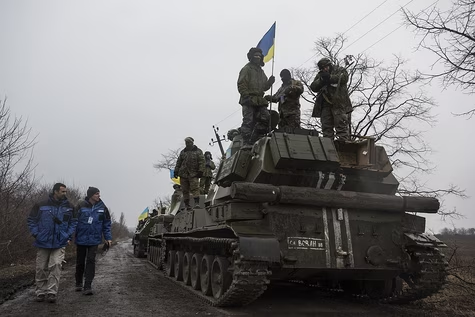
OSCE – Notable Successes
-
Minsk Group on Nagorno-Karabakh - In 1992, the OSCE Minsk Group organised a conference to resolve the conflict between Armenia and Azerbaijan. The conference was never held; however, it contributed to the development of the Minsk Process and helped establish a framework for negotiating a settlement. The group was co-chaired by the United States, Russia, and France, with a focus on dialogue, mediation and reducing hostilities.
-
Dayton Peace Accords - In 1995, the OSCE played an integral role in the implementation of the Dayton Peace Accords - The General Framework Agreement for Peace in Bosnia and Herzegovina. They provided support for the non-security aspects of the agreement, including political and economic reforms, organising elections, building inter-ethnic relations, and monitoring human rights. The OSCE Mission to Bosnia and Herzegovina works on the ground connecting communities and facilitating stability. Their work helped put an end to the three and a half year long Bosnian War.
-
Kosovo Verification Mission - In 1998, the OSCE created this mission to oversee compliance with the ceasefire agreements, the UNSC Resolution 1203 and the Clark-Naumann agreement between Serbian forces and ethnic Albanian rebels. The mission laid the groundwork for ending atrocities in Kosovo, helping affected citizens, withdrawing armed forces, and preparing for future peace initiatives. It also helped to ensure that an independent and just police service was established.
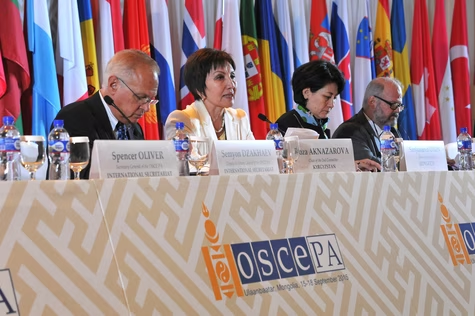
-
Election Observation in Kyrgyzstan - The OSCE have been invited many times over the years to observe parliamentary elections in Kyrgyzstan to strengthen transparent, fair and free elections. Their missions have played a critical role in promoting democratic processes and electoral reform towards democratic governance. Years of political crises have resulted in candidate dominance, questionable funding, the misuse of administrative resources, and bias in media reporting. The OSCE has provided recommendations over the years, and their election observation is recognised as one of the most effective ways to encourage States' commitment to democracy.
-
Environmental Diplomacy in Central Asia - In a region with large-scale ecological concerns, a collaborative approach by the OSCE has helped to support transboundary initiatives and foster regional stability. Water management projects across Kazakhstan, Kyrgyzstan, Tajikistan, Turkmenistan, and Uzbekistan have been crucial in improving water security in the region. In 2003, the Environment and Security (ENVSEC) Initiative was created to strengthen national capacities, regional co-ordination mechanisms and international cooperation for climate and security risk reduction. It is made up of the OSCE, the United Nations Development Programme (UNDP), the United Nations Environment Programme (UNEP), the United Nations Economic Commission for Europe (UNECE) and the Regional Environmental Centre for Central and Eastern Europe (REC).
-
Combating Human Trafficking in Moldova - OSCE Mission to Moldova works closely with local authorities to enhance their capacity to combat human trafficking. The humanitarian crisis caused by the Russian attack on Ukraine has created a high risk of trafficking amid the flow of refugees. The OSCE orchestrated the first national simulation exercise, which brought together the entire Moldovan anti-human trafficking community. Their efforts have helped to improve legal frameworks, provide better support for victims, and significantly strengthen Moldova's ability to respond to the crisis.
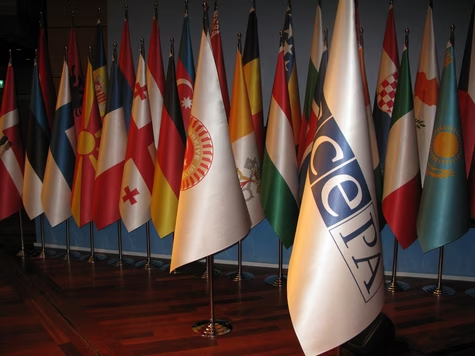
OSCE – Limitations & Challenges
One of the primary challenges of the OSCE is geopolitical tensions among its 57 member states. In particular, major powers like the United States, Russia, and the European Union have strong self-serving interests which often clash with the common goals of the organisation.
Growing divisions, especially the breakdown of trust between Russia and other European countries, have significantly weakened the OSCE's ability to act. Decisions are taken by consensus; therefore, even just one vote can block important progress in responding to a crisis or even hinder basic operations. Consensus-based decision-making leaves the organisation highly susceptible to politicisation.
Russia created a gridlock in operations after their invasion of Ukraine by objecting to unified budgets for 2022/23. This left the OSCE working on monthly allowances, constraining their ability to respond quickly and effectively to emerging crises.
The OSCE's lack of power to enforce is another issue which has emerged since the invasion of Ukraine. Accords under the OSCE are not legally binding and therefore members are not held accountable if they fail to adhere to the agreements. Russia's full-scale invasion of Ukraine remains a direct assault on the principles of the Helsinki Final Act, yet no action has been taken.
In 2024, fresh controversy surrounded the organisation as Russia and Belarus opposed Estonia's bid for the chairmanship. The veto left them without a leader and prevented them from adopting a budget, extending missions, and completing routine operations. A representative from non-NATO member Malta was eventually voted in instead.
*****
Today, the OSCE is widely regarded as a significant player in peacebuilding and conflict prevention. They remain the only cooperative security organisation which brings together all the NATO allies, Ukraine, Russia, and the Central Asian states. Their diverse agenda covers arms control to youth empowerment, and with their focus clearly on diplomacy and collaboration, they continue to make the world a safer and more secure place.
Author: Rachael Mellor, 19.09.25 licensed under CC BY-SA 4.0
For further reading on the OSCE see below ⬇️
- Organization for Security and Cooperation in Europe (OSCE) 46922
- OSCE Tools for each phase of the conflict cycle 440022
- OSCE - Newsroom 46923
- OSCE - Publications 46924
- OSCE Toolbox (for each stage of the conflict cycle) 420776
- @OSCE 46925
- Facebook - OSCE 46926
- OSCE Handbooks 46927
- Leonid Kozhara - Wikipedia 267974
- OSCE - Annual Reports 46928
- OSCE - Documents Library 46929
- Conference on Security and Co-operation in Europe - Wikipedia 265982
- Helga Schmid - Wikipedia 265988
- @HelgaSchmid_SG 265989
- CoE and OSCE National Minority Standards 420777
- NTI - Organization for Cooperation and Security in Europe (OSCE) 265994
- Organization for Security and Co-operation in Europe - Wikipedia 265981
- OSCE Parliamentary Assembly 265986
- Paris Charter - Wikipedia 265984
- Relief Web - Organization for Security and Co-operation in Europe 265996
- YouTube - OSCE 265995
- The Conversation 488324
- Podcast: Is The OSCE Still Relevant? - RFE 05.08.25 488332
- 50 Years After The Helsinki Final Act, Can The OSCE Stay Relevant? - RFE 31.07.25 488327
- The Helsinki Final Act at 50: Relevant, or relic? - CER 28.07.25 488328
- Assessing the OSCE toolbox: Opportunities for a safer Europe - ELN 14.03.25 488321
- It's time to use the OSCE - ELN 11.03.25 488323
- Russia and Ukraine face off at European security conference as all sides wait for Trump presidency - Conversation 11.12.24 488325
- Russia has repeatedly violated its OSCE commitments through its actions in Ukraine: UK statement to the OSCE - Gov.uk 17.10.24 488316
- In troubled waters. The OSCE in times of war - EPDE 14.10.24 488315
- Support for the OSCE is more crucial than ever: UK statement to the OSCE - Gov.UK 26.06.24 488319
- Baltic foreign ministers pull out of OSCE summit over Russia invite - Al Jazeera 28.11.23 386104
- What Shall We Do With the OSCE? - RUSI 27.07.23 488314
- How creative diplomacy has averted a collapse of the OSCE – until now - Security & Human Rights Monitor 04.07.23 488317
- EU leaders agree to cut reliance on China - DW 30.06.23 356226
- Stronger together: Marking 30 years of OSCE - UN co-operation - Egmont 02.06.23 488331
- Austria criticised for allowing 18 Russian MPs to attend security meeting - Guardian 21.02.23 330995
- Neutral Austria Faces International Criticism - Foreign Policy 13.02.23 329053
- Glenn Diesen: OSCE and the collapse of pan-European security system - TFF 03.01.23 324839
- 2022 was a difficult year for the OSCE: How the organisation is responding to Russia’s obstructionist policy and why supporting the work of the OSCE is worthwhile - Federal F… 488318
- Publication: Birmingham Declaration and Resolutions - OSCEPA 07/22 296188
- Changing perceptions towards migrants takes a joint effort - OSCE 08.06.21 267976
- OSCE secretary-general Helga Schmid: A skilled negotiator - DW 04.12.20 265990
- EU top diplomat Helga Schmid appointed OSCE secretary general - Politico 04.12.20 265991
- Is the OSCE still relevant in Nagorno Karabakh? - Ridl 04.12.20 488330
- European Parliament briefing - The Organization for Security and Co-operation in Europe (OSCE) - EPRS 09/18 265983
- Hungary election: OSCE monitors deliver damning verdict - Guardian 09.04.18 488320
- Is the OSCE Relevant in the 21st Century? - Chatham House 07.04.11 488329
- Belarus closes down OSCE office after poll criticism - BBC 31.12.10 488322
- OSCE: the West’s tool to legitimize the illegitimate - Crescent 01.05.10 488326
- Reform will enhance the OSCE's relevance - FT 28.11.04 488334
- The effectiveness of OSCCE missions: The cases of Uzbekistan, Ukraine and Bosnia and Herzegovina - Clingendael 02/03 488333
- Charter of Paris for a New Europe - OSCE 21.11.90 265985
- Migration - OSCE 267975
- Women, Peace and Security - OSCE 420779
- Treaty on Open Skies - OSCE 420781
- Annual Security Review Conference (ASRC) - OSCE 420782
- Mediation and Dialogue Facilitation - OSCE 420783
- Quiet diplomacy - OSCE 420790
- Berlin Mechanism - OSCE 420791
- Valletta Mechanism - OSCE 420794
- Global Exchange of Military Information (GEMI) - OSCE 420795
- OSCE Early Warning Focal Point Network 420796